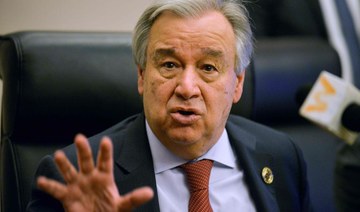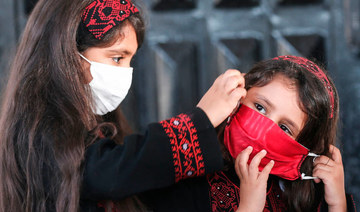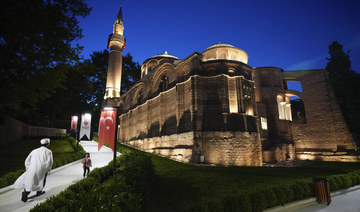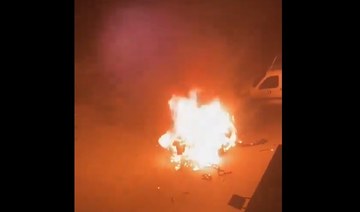DUBAI: The cogs of global commerce are slowly turning as countries gradually reopen their economies in a bid to a return to normalcy amid the coronavirus pandemic.
The coronavirus crisis however has unleashed a ‘tsunami of hate and xenophobia, scapegoating and scare-mongering’ according to UN Secretary-General Antonio Guterres, as he called on political leaders to show solidarity with all people, on educational institutions to focus on ‘digital literacy’ at a time when ‘extremists are seeking to prey on captive and potentially despairing audiences.’
Friday, May 8, 2020 (all times in GMT)
18:58 - US President Donald Trump, without offering any evidence, said on Friday the coronavirus outbreak is going to go away without a vaccine.
18:05 - The number of people who have died from coronavirus infection in France rose 243 to 26,230 on Friday, a higher daily death toll than the previous day when it stood at 178.
The Health Ministry said in a statement that the number of people in intensive care units - a key measure of a health system's ability to deal with the epidemic - fell by 93 or 3% to 2,868, well below half the peak of 7,148 seen on April 8.
17:00 - The United States on Friday prevented a vote in the UN Security Council on a resolution on the coronavirus pandemic, apparently because it made implicit mention of the World Health Organization, diplomats said.
The text, under negotiation since March, called for a worldwide cessation of hostilities in conflict zones so governments can address the pandemic.
The United States blocked a procedure that would have led to a vote on the resolution, the diplomats said.
16:27 - Coronavirus deaths in the state of NewYork increased by 216 on May 7 as opposed to 231 deaths a day earlier.
16:16 – UK coronavirus total death toll reaches 31,241 after 626 new deaths recorded.
16:03 – Jordan records 24 new cases of coronavirus
15:55 - Italy on Friday became the third country in the world to record 30,000 deaths from the coronavirus, reporting 243 new fatalities compared with a daily tally of 274 the day before.
15:53 – The EU called on Friday for a ban on “non-essential” travel to Europe to be extended until June 15.
13:30 – Kuwait applies a nationwide "total curfew" starting Sunday.
12:43 – Saudi Arabia reported 1,701 new coronavirus cases, bringing the total to 35,432 infected people. Health officials also said that 1,322 patients have recovered, bringing the total to 9,120 recoveries.
12:30 – Qatar confirmed 1,311 new COVID-19 cases, bringing the total to 20,201 infected people.
12:16 – Bahrain reported 27 new coronavirus recoveries, bringing the total to 2,027 recovered patients.
11:47 – The coronavirus’ constant mutation is unlikely to have changes its potency or its contagiousness, disease experts say, despite recent research suggesting the emergence of a more virulent strain. READ THE STORY
10:52 – UAE confirmed 553 new coronavirus cases, bringing its caseload to 16,793.
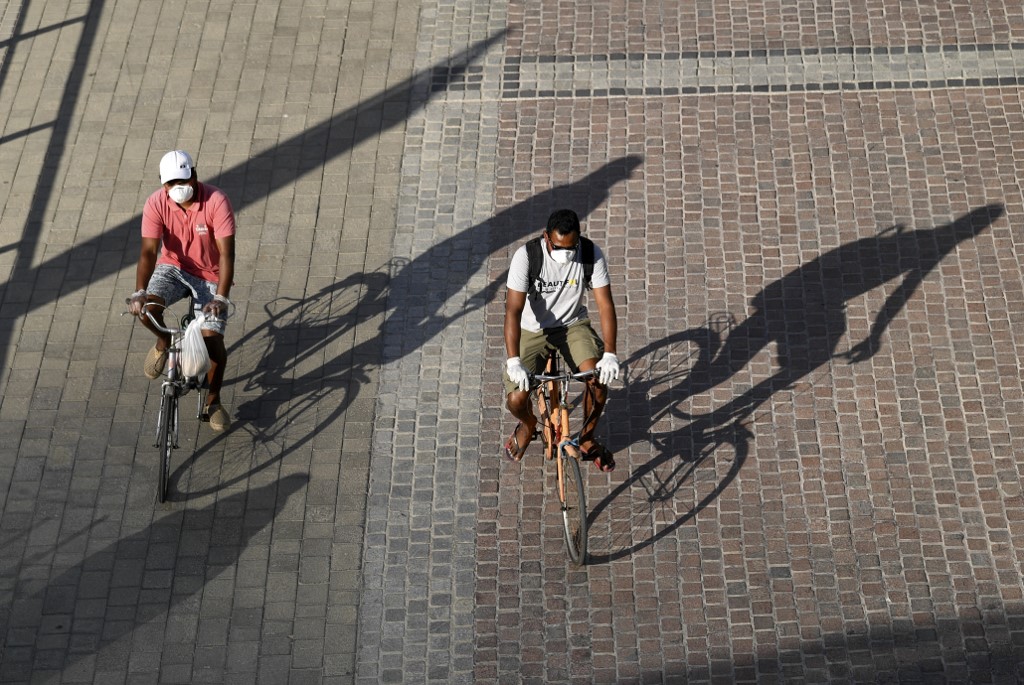
Foreign workers wearing protective masks bike home after work at Dubai Marina on May 5, 2020. (AFP)
10:50 – Lebanon said there were 12 new coronavirus cases and a fatality; total infections now at 796 and deaths at 26.
10:48 – Two weeks after Indonesia banned air and sea travel to contain the spread of the coronavirus, the transport ministry has confirmed that flights and public transport will conditionally resume. READ THE STORY
10:38 – Kuwait confirmed 85 new coronavirus recoveries, bringing the total to 2,466 recovered patients.
10:30 – Spain’s coronavirus cases rose to 222,857 while fatalities increased to 26,299.
10:15 – Morocco’s coronavirus cases increased to 5,661 while fatalities reached 185.
09:31 – Social distancing markings that will oblige us to keep apart in busy social settings, in order to prevent transmission of the new coronavirus, are appearing on shop floors, city pavements and train or tram platforms the world over. READ THE STORY
08:35 – Russia registered more than 10,000 new coronavirus cases for the sixth day in a row, after emerging as a new hotspot of the pandemic.
08:23 – Oman reported 154 new coronavirus cases, bringing its total caseload to 3,112.
06:29 – Japan will look into additional steps to cushion the economic blow from the coronavirus pandemic, its economy minister said. READ THE STORY
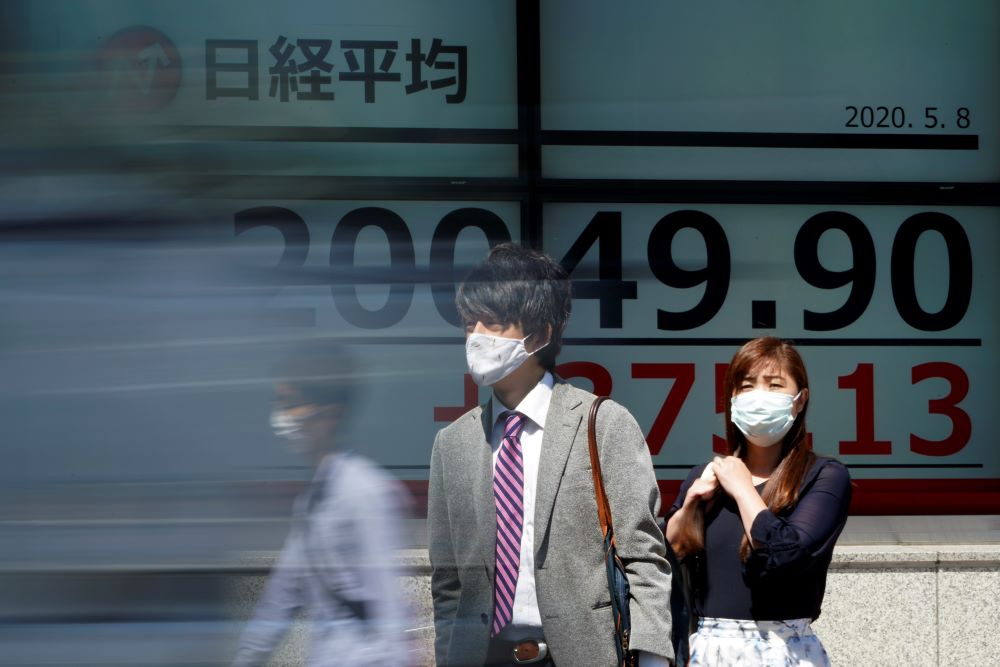
The Japanese economy likely shrank for a second straight quarter, a poll shows. Above, an electronic stock board showing Japan’s Nikkei 225 index on Friday, May 8, 2020. (AP)
05:12 – UN Secretary-General Antonio Guterres said the coronavirus pandemic keeps unleashing “a tsunami of hate and xenophobia, scapegoating and scare-mongering” and appealed for “an all-out effort to end hate speech globally.” READ THE STORY
05:08 – India’s coronavirus monitoring technology has prompted a raft of questions about privacy, security and potential data breaches — and whether it compromises civil liberties and gives the government snooping powers.
05:00 – Thailand reported eight new coronavirus cases but no deaths, bringing the total to 3,000 cases and 55 deaths since the outbreak started in January.
04:04 – Chinese and US trade representatives agreed to “create favorable conditions” for the phase one trade deal signed in January, officials said, despite recent tensions over the coronavirus pandemic.
03:33 – Coronavirus cases in Pakistan surged past 25,000, just hours before the government was due to lift lockdown measures, with the country reporting some of the biggest daily increases in new infections in the world.




